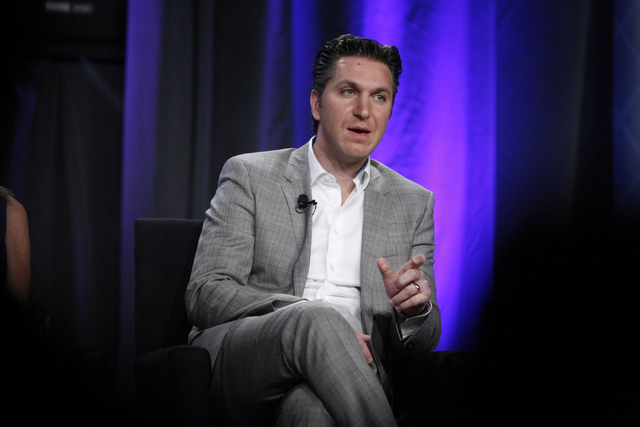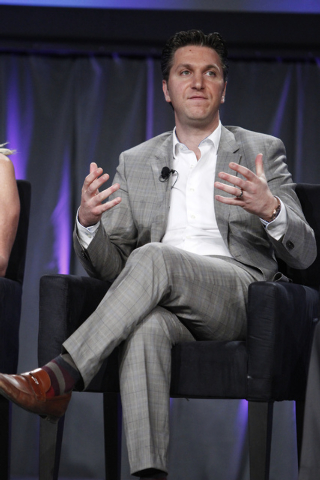Amaya Gaming CEO garners limelight of online gaming






It’s not every day that the CEO of a Canadian gaming company steals attention from the chief executives of four major slot machine manufacturers during a keynote round table at the Global Gaming Expo.
Amaya Gaming Group CEO David Baazov, however, engineered the $4.9 billion acquisition this summer of online gaming giant PokerStars. The transaction was arguably the most intriguing deal in what has become a year of gaming-equipment sector consolidation.
If Baazov succeeds in restoring the once-tainted PokerStars presence in the United States, the move could change dramatically the financial prospects of the sagging American online gambling market.
Baazov, 33, has his work cut out for him.
PokerStars has applied for an interactive gaming license in New Jersey, where it would operate the online presence for Resorts Atlantic City.
The competition doesn’t want PokerStars to have a seat at the table. The company controls 54 percent of the global online gaming traffic outside the United States and probably would attract its former American customers.
The company operated illegally in the United States after the 2006 passage of the Unlawful Internet Gambling Enforcement Act. PokerStars paid a $731 million settlement to federal prosecutors two years ago that made criminal and civil charges disappear.
Montreal-based Amaya stepped in and bought PokerStars’ privately held parent company in a deal that closed Aug. 1. The former ownership and management of PokerStars was scrubbed from the business. The Canadian company is now running the show for PokerStars, which is operated in the Isle of Man.
Amaya is licensed to provide gaming equipment in several U.S. states, including New Jersey. The company is not licensed in Nevada. Amaya also has licenses with U.S. tribal gaming jurisdictions, European nations and Canadian provinces.
New Jersey Gaming Enforcement Division Director David Rebuck, in a September interview with the Las Vegas Review-Journal in Atlantic City, acknowledged the agency is investigating Amaya’s buyout of PokerStars. The main concern is how the business’ management had been restructured.
“We know this is an issue of great importance to the industry,” Rebuck said. “(PokerStars) has been out of the U.S. for three and a half years already. There is no debate on that.”
In a brief interview after his appearance at G2E, Baazov said he was aware of Rebuck’s public comments.
“We have a number of licenses in the U.S., and we work with a number of other operators,” Baazov said.
Those partnerships include supplying online games to multiple Atlantic City casinos for Internet wagering in New Jersey.
Nevada has a five-year ban on companies that took wagers after 2006. But Baazov wasn’t tipping his hand about the Silver State.
“Time answers everything,” Baazov said.
Passage in New Jersey is key to unlocking PokerStars’ future in the United States.
Before the sale to Amaya, the website had a deal in place with the Morongo Band of Mission Indians and three California card rooms to participate in online poker in the Golden State. Legislation legalizing online poker stalled this year in Sacramento, but it’s expected to be revisited in 2015. However, more than a dozen other tribes want PokerStars banned through a “bad actor clause.”
In Nevada, the company would have to partner with a casino for online gaming. But most of the major Strip and downtown casino operators have deals in place, minus Wynn Resorts Ltd. and Las Vegas Sands Corp., which want nothing to do with the activity.
G2E audience members who hoped Baazov would lay out Amaya’s plans for PokerStars were disappointed. PokerStars was only alluded to in the abstract.
Baazov, seated between International Game Technology CEO Patti Hart and Multimedia Games CEO Patrick Ramsey, addressed questions about the casino industry’s move to attract millennial gamblers and how the slot machine industry needs to stay current.
“Statistically, young adults are more likely to play slots,” Baazov said. “It’s an increased demand from the customer that is driving us to innovate.”
That same week, Baazov participated in the Deutsche Bank Global Leveraged Finance conference in Scottsdale, Ariz. Again, discussion of U.S. plans for PokerStars was muted. Baazov said PokerStars and its affiliated Full Tilt Poker brand would continue to dominate Europe.
“We note that, combined, these brands have approximately 10 times more liquidity than 888 Poker and are the leaders in Italy, Spain and France,” Deutsche Bank gaming analyst Andrew Zarnett said.
Baazov said Amaya plans to expand into other legal online gaming areas in Europe, including real-money casino and real-money sports wagering. He said 50 percent of online poker players also play online casino games.
At G2E, Baazov said the slew of gaming equipment company consolidations this year was conceived through a combination of low interest rates, an access to capital that had been sidelined and timing.
Amaya took on almost $3 billion in debt to finance the PokerStars deal. Baazov told the leveraged finance conference that the company plans to reduce its debt through cash flow.
The last question posed to the G2E panel by moderator Bo Bernhard, executive director of the University of Nevada, Las Vegas’ International Gaming Institute, dealt with any books the CEOs had recently read.
Baazov cited “Outliers: The Story of Success,” by Canadian journalist Malcom Gladwell, which examines how a person’s environment, personal drive and motivation affects his opportunity for success.
Success for Baazov and Amaya will come the first time a legal hand of online poker is dealt from a PokerStars website located in the United States.
Howard Stutz’s Inside Gaming column appears Wednesdays and Sundays. He can be reached at hstutz@reviewjournal.com or 702-477-3871. Follow on Twitter: @howardstutz.












